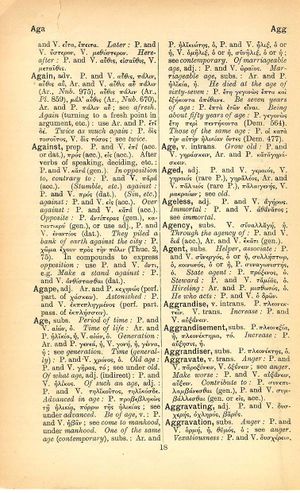age
Κατηγορεῖν οὐκ ἔστι καὶ κρίνειν ὁμοῦ → Iudex et accusator esse idem nequit → Wer anklagt, darf nicht auch noch Richter sein zugleich
English > Greek (Woodhouse)
subs.
Period of time: P. and V. αἰών, ὁ.
Time of life: Ar. and P. ἡλικία, ἡ, V. αἰών, ὁ.
Generation: Ar. and P. γενεά, ἡ, V. γονή, ἡ, γέννα, ἡ; see generation.
Time (generally): P. and V. χρόνος, ὁ.
Old age: P. and V. γῆρας, τό; see under old.
Of what age, adj. (indirect): P. and V. ἡλίκος.
Of such an age, adj.: P. and V. τηλικοῦτος, τηλικόσδε.
Advanced in age: P. προβεβληκὼς τῇ ἡλικίᾳ, πόρρω τῆς ἡλικίας; see under advanced.
Be of age, v.: P. and V. ἡβᾶν; see come to manhood, under manhood.
One of the same age (contemporary), subs.: Ar. and P. ἡλικιώτης, ὁ, P. and V. ἧλιξ, ὁ or ἡ, V. ὁμῆλιξ, ὁ or ἡ, συνῆλιξ, ὁ or ἡ; see contemporary.
Of marriageable age, adj.: P. and V. ὡραῖος.
Marriageable age, subs.: Ar. and P. ἡλικία, ἡ.
He died at the age of sixty-seven: P. ἔτη γεγονὼς ἕπτα καὶ ἐξήκοντα ἀπέθανε.
Be seven years of age: P. ἑπτὰ ἐτῶν εἶναι.
Being about fifty years of age: P. γεγονὼς ἔτη περὶ πεντήκοντα (Dem. 564).
Those of the same age: P. οἱ κατὰ τὴν αὐτὴν ἡλικίαν ὄντες (Dem. 477).
v. intrans.
Grow old: P. and V. γηράσκειν, Ar. and P. καταγηράσκειν.
Latin > English (Lewis & Short)
ăge: and ăgĕdum, v. ago, II. 12.
Latin > French (Gaffiot 2016)
ăgĕ,⁹ ăgĭtĕ, ăgĕdum, ăgĭtĕdum, (ago), anciens impératifs devenus de pures interjections : eh bien ! allons ! or çà ! [les formes du sing. age, agedum sont employées même quand elles s’adressent à une pluralité : Pl. Mil. 928 ; St. 221 ; As. 828 ; Cic. n’emploie jamais agite ]

